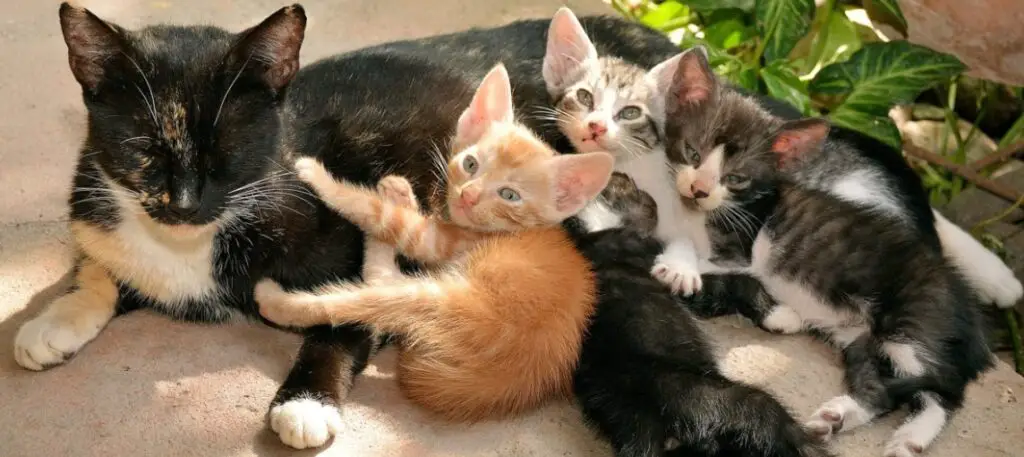Should cats be neutered ?
You’re never required to spay or neuter your cat, because by doing this you’re depriving him of one of its basic needs. However, neutering can protect him from certain infectious diseases such as FIV and behavioral problems .Neutered cats are also more likely to bond with their owners and not escape the home.

Why should I have my cat sterilized?
The first purpose of spaying or neutering a cat was to avoid reproduction for people who don’t want to have several kittens in their home at a time.
So if you have a spayed or neutered cat it will not give birth to kittens that may be abandoned, which may also be another purpose. But then studies have shown that there are other benefits and purposes behind spaying and neutering cats whether male or female:
Neutering as a Prevention of sexually transmitted diseases (FIV)
FIV is one of the most common diseases in cats, it is the AIDS of cats. Neutering your cat, whether male or female, will prevent this serious disease.
Prevention of other infectious cat diseases by spaying them
Besides FIV, infectious diseases of the urinary tract can also be prevented by neutering, and therefore prevention of kidney diseases, because the kidneys of cats are very fragile.
Neutering can prevent cats from mammary tumors
Spaying the cat is the most effective way to prevent mammary cancer. A sterilization before 6 months can reduce the risk to 91%. The same is true for ovarian and uterine tumors.
Neutering to avoid behavioral problems in cats
Cats, whether male or female, that are not sterilized and never able to mate can develop frustration-related problems (irritability, distant behavior, obsessions) .Unneutered cats tend to become more noisy and unusually nocturnal , especially during the mating seasons.
Spayed cats are less likely to leave their homes
According to animal behaviorists, spayed or neutered cats generally have no desire to leave their homes, so it’s a benefit to them and to you that they stay in your home safely.
Reduce the risk of accidents by neutering your cat
Cats that are not neutered often get into fights with other cats, and during this fight and due to the lack of concentration of the cats, many of them have been run over by a car, and others have injured each other. Neutering is a way to avoid aggression and its consequences.
What can replace cat Spaying ?
Apart from neutering your cat , there is also contraception, which consists of giving injections or medication to your cat every time before it comes into heat.
This method is less effective than spaying . In addition the contraception has to be repeated several times, so more stress if it will work or not, more costs and there are still almost the same disadvantages as sterilization. So most people nowadays go for spaying and neutering.
How can spaying my cat help me as an owner?
Unspayed cats can give birth to several kittens at a time, so you will need more time and attention for them and more responsibility and expense.
You will be less stressed about your cat if she is pregnant or stressed about the health status of these kittens, and whether she will give birth safely or not.
There is less chance that your cat will go missing if she is spayed or neutered, so you won’t suffer because of her disappearance.
Can my cat live a healthy life without being neutered?
Yes, your male or female cat can live a normal life without spaying, but with more maintenance and prevention of infection risks.
But you must let your cat have all its needs, physiological as the need to mate. If not, your cat will have a feeling of frustration, and it can develop into a psychological disorder such as anxiety, nervousness, eating disorder (she eats too much), and even depression, and for some it disappears!
How do I know if my cat needs to mate?
Unneutered male cats
Around six months of age, you will usually know soon enough that it is time for him to start marking his territory. By the way , both male and female cats are gonna spray urine even though you neuter them . This can be interpreted as a sudden refusal to use the litter box, for which you may be tempted to find external reasons, but often it’s just the hormones talking. He is most excited in the spring.
He is attracted to the cat’s loud, repetitive meows and the pheromones in her urine ( smelly urine ) . Males are ready to mate between 5 and 8 months after birth. As for the females, their sexual maturity takes place between 4,5 and 12 months.
Unneutered female cat
More agitated, eats less, She becomes more affectionate, rubs more against you and against the furniture, meows a lot.
To avoid the frustration that can happen, you must choose to adopt only one cat breed and gender , if not you must keep them apart, or neither can hear the other.
But this is still not enough because, if they are not sterilized, you cannot deprive them of their physiological needs to live.
Will neutering make my cat suffer?
At the beginning of the operation, the veterinarian will inject your cat with anesthesia so that he or she will not feel any pain or wake up. So your cat may feel the pain of the injection at first.
Then the vet will make two small incisions on the flanks of the cat or below the belly button.
So it will be painful when waking up, but the cat should stay under anesthesia after a few weeks to feel less pain. After 3 days the cat can return to normal life.
How do I know if my cat is in pain after spaying it ?
The cat will feel pain and have sensitive areas for a few days. This may explain some aggression towards people who touch the cat in these areas, even the owner.
Will my cat like being spayed or neutered?
No living thing likes to stay in its natural state. Neutering your cat will make him suffer for a few days, there will be a hormonal disruption, so it may have behavioral problems (eating less), but seeing the benefits that spaying has for your cat, sometimes owners ignore these feelings for the welfare of the owner himself and the well-being of his cat.
What are the risks of spaying and neutering cats?
1- During the neutering process
They are called nosocomial infections (microbes that can be caught in the veterinarian’s office by contamination), the veterinarian is aware of this, so he must sterilize and clean his environment well before receiving a new cat.
2- After the spaying or neutering
The male cat, especially the female cat, after spaying them, often tends to gain weight and become obese, because some people do not know that a cat after being neutered requires fewer calories than a cat that is not sterilized.
But when a male or female cat loses its satiety hormones after sterilization, it becomes greedy and overeats. The excess calories it takes in will go to fat stores, and this imbalance promotes obesity.
So decrease the amount of food your cat eats per day, and divide it into several small meals .
But we must not forget that about 1 year after spaying him, your cat may become a subject with very sensitive kidneys at risk of polycystic kidney disease (formation of cysts in the kidneys).
Will my cat’s behavior change after I neuter her?
A few days after leaving the veterinarian’s office, a tired cat does not eat too much, this is only a recovery phase after neutering. In about 3 days he will behave normally and he will regain his appetite.
Your cat will become calmer and closer to you (because it no longer needs to go looking for a female).
At what age should my cat be neutered?
A cat must be neutered at or before puberty. That is to say, before 6 months to 12 months. The later the spaying, the less effective it is.
The female arrives more quickly at the age of puberty or she must be sterilized so she can be sterilized from 4 months to 7 months.
What is the difference between neutering a male and female cat?
Spaying a female cat involves the removal of the ovaries responsible for the secretion of her hormones. The veterinarian will remove the ovaries of the cat under general anesthesia.
In case of male cats it is also called castration, the operation consists in removing the testicles of the cat by a skin incision. The anesthesia is of short duration and stitches are enough to close the incision.
The operation for the male cat is therefore much less cumbersome than for the female. It is also much faster.
How do I take care of my cat after it has been neutered?
For the first 3 days after they come home, avoid touching your cat. They will not like to be touched when they have pain in any part of their body.
Observe him from a distance, in case of bleeding, or loss of appetite do not hesitate to take him back to the vet.
Do not let him out and keep him inside for a few days.
Put a newspaper instead of grains in his litter box, you must avoid that these grains enter his wound.
Your cat’s bandage should only be removed after 3 or 4 days. If it needs to be changed, the veterinarian should do so.
Your cat should not be bathed until 10 to 15 days after the operation.
Monitor his weight gain. Weigh him every morning at the same time.
After getting her/him neutered , you must pay more attention to your cat’s diet. He will need to take in fewer calories than a non-sterilized cat. Because the sterilized cat tends to gain weight and become obese.
What should my cat eat after being neutered?
You should go directly to the special kibbles for sterilized cats. The caloric needs of a sterilized cat must be reduced to 30%. The first thing to do after the operation is to ask your veterinarian the ideal ration in grams that corresponds to your cat (because it must be calculated according to several parameters, weight, size, sex, ).
Choose foods with a low amount of fat, rich in high quality proteins (because don’t forget your cat has not finished growing) and fibers to increase the volume of food without bringing calories.
For a smooth transition, start the “diet”, little by little, one or two weeks before the operation.
Your cat’s plate or kibble should always contain vegetables as well.
Split your cat’s food into several meals per day. Up to 11 times a day.
Have your cat invest in anti-gobbling bowls, especially for cats on a low-calorie diet that are at risk of obesity.
How much does it cost to have a cat spayed?
Spaying a female cat: $100 to $200.
Spaying a male cat is quicker and easier and costs a little less: $60 to $ 75 .
Final Thoughts
Finally, we can say that you are not obliged to neuter your cat, but neutering is an effective way to avoid unwanted reproduction and its consequences, more responsibility, more costs, stress, accidents and all its disadvantages.
You will certainly like the result and the ease of the operation at the beginning. But there are risks that can happen after one year like polycystic kidney syndrome, obesity.
There is also another way to avoid contraception without sterilizing your cat by contraception, which can bring an advantage is that your cat can restore its hormones and they are not gone permanently.


